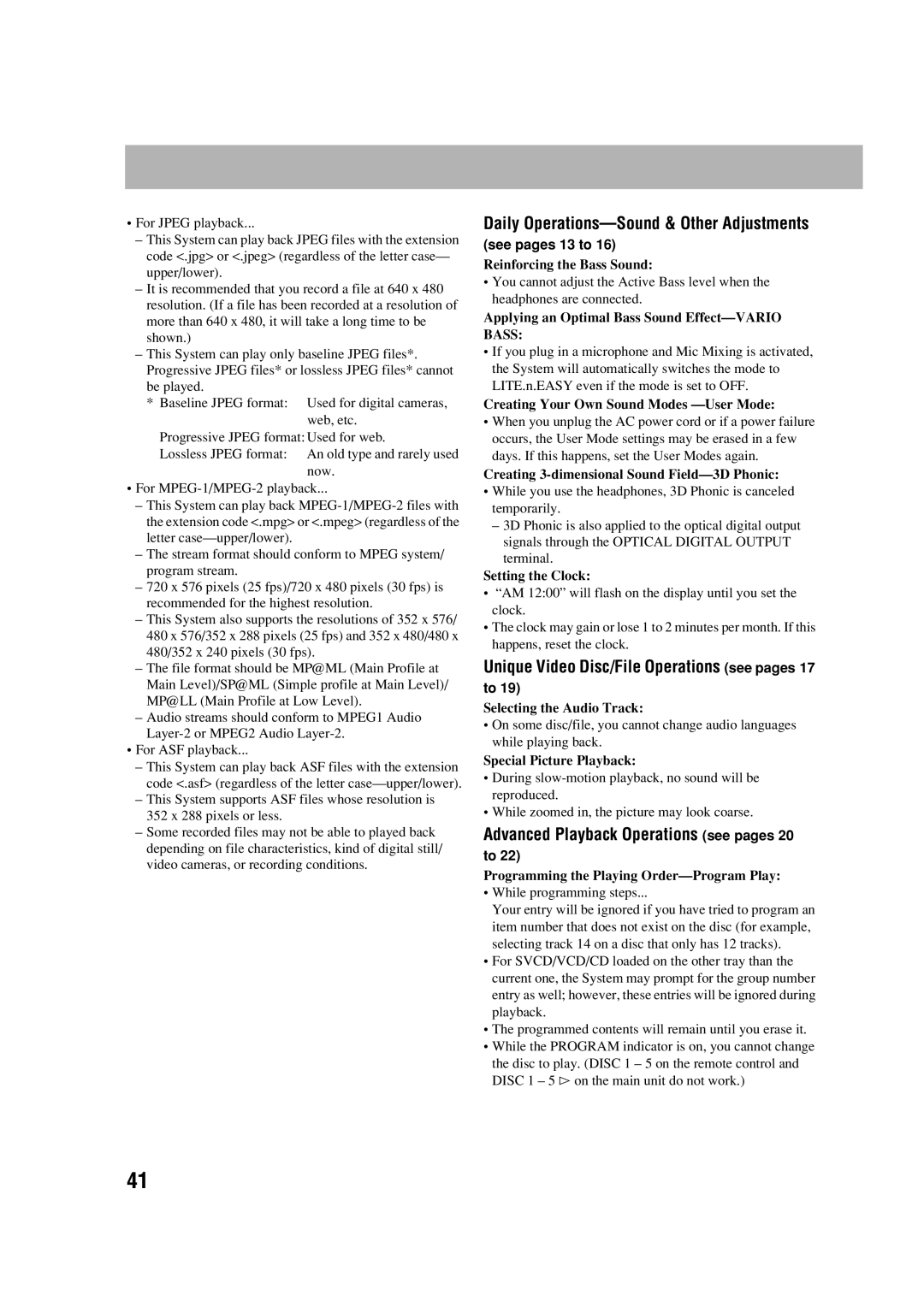•For JPEG playback...
–This System can play back JPEG files with the extension code <.jpg> or <.jpeg> (regardless of the letter case— upper/lower).
–It is recommended that you record a file at 640 x 480 resolution. (If a file has been recorded at a resolution of more than 640 x 480, it will take a long time to be shown.)
–This System can play only baseline JPEG files*. Progressive JPEG files* or lossless JPEG files* cannot be played.
*Baseline JPEG format: Used for digital cameras, web, etc.
Progressive JPEG format: Used for web.
Lossless JPEG format: An old type and rarely used now.
•For
–This System can play back
–The stream format should conform to MPEG system/ program stream.
–720 x 576 pixels (25 fps)/720 x 480 pixels (30 fps) is recommended for the highest resolution.
–This System also supports the resolutions of 352 x 576/ 480 x 576/352 x 288 pixels (25 fps) and 352 x 480/480 x 480/352 x 240 pixels (30 fps).
–The file format should be MP@ML (Main Profile at Main Level)/SP@ML (Simple profile at Main Level)/ MP@LL (Main Profile at Low Level).
–Audio streams should conform to MPEG1 Audio
•For ASF playback...
–This System can play back ASF files with the extension code <.asf> (regardless of the letter
–This System supports ASF files whose resolution is 352 x 288 pixels or less.
–Some recorded files may not be able to played back depending on file characteristics, kind of digital still/ video cameras, or recording conditions.
Daily Operations—Sound & Other Adjustments
(see pages 13 to 16)
Reinforcing the Bass Sound:
•You cannot adjust the Active Bass level when the headphones are connected.
Applying an Optimal Bass Sound Effect—VARIO BASS:
•If you plug in a microphone and Mic Mixing is activated, the System will automatically switches the mode to LITE.n.EASY even if the mode is set to OFF.
Creating Your Own Sound Modes —User Mode:
•When you unplug the AC power cord or if a power failure occurs, the User Mode settings may be erased in a few days. If this happens, set the User Modes again.
Creating 3-dimensional Sound Field—3D Phonic:
•While you use the headphones, 3D Phonic is canceled temporarily.
–3D Phonic is also applied to the optical digital output signals through the OPTICAL DIGITAL OUTPUT terminal.
Setting the Clock:
•“AM 12:00” will flash on the display until you set the clock.
•The clock may gain or lose 1 to 2 minutes per month. If this happens, reset the clock.
Unique Video Disc/File Operations (see pages 17
to 19)
Selecting the Audio Track:
•On some disc/file, you cannot change audio languages while playing back.
Special Picture Playback:
•During
•While zoomed in, the picture may look coarse.
Advanced Playback Operations (see pages 20
to 22)
Programming the Playing Order—Program Play:
•While programming steps...
Your entry will be ignored if you have tried to program an item number that does not exist on the disc (for example, selecting track 14 on a disc that only has 12 tracks).
•For SVCD/VCD/CD loaded on the other tray than the current one, the System may prompt for the group number entry as well; however, these entries will be ignored during playback.
•The programmed contents will remain until you erase it.
•While the PROGRAM indicator is on, you cannot change the disc to play. (DISC 1 – 5 on the remote control and DISC 1 – 5 # on the main unit do not work.)
41
